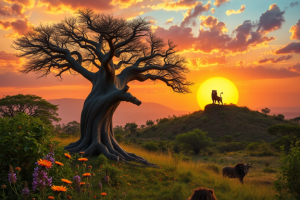
Once while I was walking down on the road to Akaki I saw a white range rover bearing the Logo Donkey Rights Group spearing its way to its destination. I could not help reflecting “Is there such a holy organization that enfranchises the most disenfranchised species?” I also felt a sense of relief. After a month I saw a similar Logo that reads Donkey’s Sanctuary.
There is a saying that runs “people highly empathetic towards humans show empathy towards animals.” I imagined the contrapositive of this sentence “people who fail to show empathy to animals are not empathetic towards humans.”
Likewise, once on a rough allay road while I was ferrying gravel stones and sands filled sacks as well as cement containing paper bags on donkey’s back from the extreme end of the Abuare Market to home with a donkey driver, I observed this poorly dressed and emaciated man was severely beating one of his donkeys tardy in walking, for bearing some injuries and heavy load.
I could not help hurling a comment “Donkey is the only animal that is not yet liberated!” Grasping the message fast, angrily, he grimaced before backlashing “How could we talk about that before man himself has not yet liberated himself?” He forced me to reflect the condition of fellow human beings who work to the bone to eke out daily bread, which more often than not could not spare them from malnourishment. I nodded my head in affirmative. But I was about to tell him the adage I read posted on a minibus taxi that “If corporeal punishment was advisable, donkeys would have make professors out of themselves.”
Similarly once sent to make TV reportage on a research paper on educational psychology, I heard a veteran lecturer of psychology noting that “there are fallacies in our teachings such as appreciating witty apes that steal seeds farmers sow and denigrating donkeys that help ferrying crops to marketplaces. The role donkeys play in helping out specially women in remote parts of the country when it comes to fetching water and firewood is incalculable.”
Belaboring on the issue he said “Telling tales to our children characterizing apes smart and donkeys’ docile results in corrupts and individuals that strive to meet ends by fair means or foul.”
While giving a piece of my mind about the issue to a veteran journalist told me a story that strengthens the case in point. “During Emperor Haile Selassie’ era, a subordinate in a certain organization insulted his boss ‘an ass’. Employees were expecting the boss to take a harsh measure against the autocrat. But the boss surprisingly ignored him. When they asked the boss “Must you downplay the insult ‘an ass’?”
“He said my subordinate didn’t insult me though he wrongly thought he blemished my name by hurling that expression. He rather amplified my being workaholic.” Many were surprised by the boss’ remark. It became the talk of the town.
The emperor summoning the exemplary boss extended a word of appreciation to him.
Labeling people working hard the ‘donkey staff’ and also labeling the meek ass-headed are wrong-headed outlooks that beg for rectification.
Besides we must remember it is on foal’s (donkey’s) back Jesus opted to travel on Hosanna.
For the importance of the skins of donkeys in medicinal activities, especially in Fareast, African donkeys are passing through slaughtering houses. The export of their skins is casting a shadow on their perpetuity.
The gestation period of a donkey extends up to 14 months and a donkey gives birth to twins. Hence, rearing donkeys is not an easy task.
Cognizant of the impending danger of extinction on African donkeys and the ingratitude of mankind to such pack animal that contributed for the economic activities of Africa, African leaders have passed a decision to ban the slaying of African donkeys.
Ethiopia, which has the highest donkey population, must adhere to this decision. Above and beyond it is important to revert back to Adwa Victory to conjure up in mind the transportation role of logistics donkeys played.
Also, here, it is important to consider the fate of pack and transportation animals when they become old and feeble. International and indigenous animals would do well if the involve in good gestures towards pack animals.
Unless the meats of the aforementioned animals find themselves in crocodile ranches where else could they go? Could they find their way to our dishes? This is the anxiety of many Ethiopians where this meat is seen a taboo (not edible).
BY ALEM HAILU KRISTOS
THE ETHIOPIAN HERALD THURSDAY 22 FEBRUARY 2024




